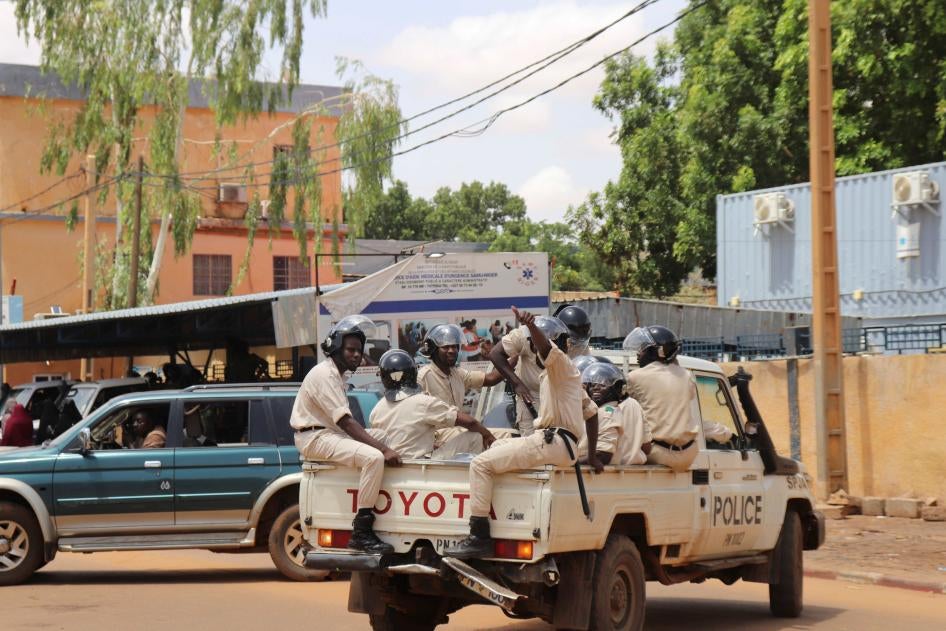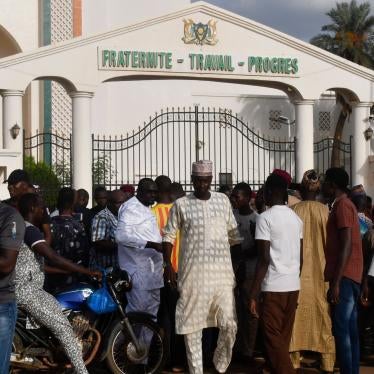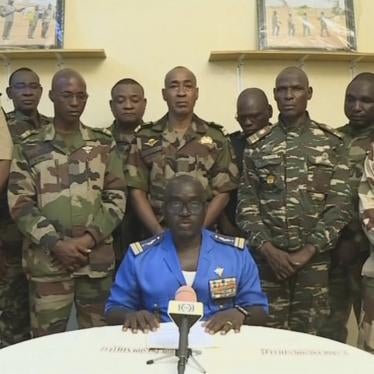(Nairobi) – Nigerien authorities have arbitrarily arrested dozens of officials from the ousted government and cracked down on critical media and peaceful dissent since the military coup on July 26, 2023, Human Rights Watch and Amnesty International said today. The authorities should immediately release those held on politically-motivated charges and ensure due process.
On July 26, Gen. Abdourahmane Tiani and other Nigerien army officers of the self-proclaimed National Council for the Safeguard of the Homeland (Conseil National pour la sauvegarde de la patrie, CNSP) overthrew the government of President Mohamed Bazoum. Since the coup, Bazoum, his wife, and son have been detained at the presidential palace in Niamey, the capital, and other officials have been arrested. The authorities have threatened, harassed, intimidated, and arbitrarily arrested journalists, youths, and perceived political opponents, as well as others expressing critical views.
“The authorities’ arbitrary arrests and assault on the right to freedom of expression put Niger on a dangerous course when it comes to human rights,” said Ilaria Allegrozzi, senior Sahel researcher at Human Rights Watch. “The authorities should end arbitrary detentions, uphold human rights, and allow media freedom.”
In response to the coup, the Economic Community of West African States (ECOWAS), on July 30, closed borders between Niger and ECOWAS’ member states, suspended commercial and financial transactions with Niger, and threatened military action if the CNSP did not release Bazoum and return him to power. On August 10, ECOWAS imposed sanctions, including travel bans and asset freezes, on the coup leaders and on the country more generally. On August 22, the African Union suspended Niger from its organs, institutions, and actions, but expressed a reserved position on a possible West African military intervention, calling for a peaceful approach for “the return to constitutional order.”
On October 11, Nigerien authorities gave the United Nations resident coordinator, Louise Aubin, 72 hours to leave the country, accusing UN Secretary-General António Guterres of “sabotage” by excluding Niger from the UN General Assembly in September.
Since the coup, the authorities have arbitrarily arrested several officials of the ousted government, including Sani Mahamadou Issoufou, former petroleum minister; Hamadou Adamou Souley, former home affairs minister; Kalla Moutari, former defense minister; and Ahmad Jidoud, former finance minister. In September, the authorities transferred them to the prisons of Filingué Say, Kollo in Tillaberi region, and Niamey and charged them with “threatening state security” before a military court, despite them being civilians, against due process. Amnesty International and Human Rights Watch consider their detentions as arbitrary for being politically motivated.
Human Rights Watch has expressed concern about Bazoum and his family’s wellbeing. The authorities should ensure their safety and respect their human rights, Human Rights Watch and Amnesty International said. On August 13, the authorities announced plans to prosecute Bazoum for “high treason” and undermining national security, but he has yet to be brought before a judge. On September 18, Bazoum filed a petition with the ECOWAS Court of Justice in Abuja, Nigeria, citing violations of human rights against him and his family during his detention. He also called for his immediate reinstatement as Niger’s president. On October 3, Salem Mohamed Bazoum, son of ousted President Bazoum, contested the legality of his detention before a Niamey high court. On October 6, the court ordered the release of Bazoum’s son. However, the CNSP has yet to implement the ruling. In an October 20 press release, lawyers representing Bazoum said that he and his wife and son were being detained in a secret location, and rejected the military authorities’ claim that he had attempted to escape.
Members of media organizations and journalists told Human Rights Watch and Amnesty International that, since the coup, they have experienced increased pressures when doing their work as well as intimidation, including threats of violence and surveillance from both government agents and other people. Since the coup, national and international journalists have been threatened, verbally harassed online, and physically attacked. On August 3, the CNSP indefinitely suspended the international news broadcasters Radio France Internationale and France 24.
“Self-censorship has become a survival tactic for many of us, especially those who have distanced themselves from the views and actions of the new authorities,” a Nigerien journalist told Human Rights Watch. “Journalists prefer not to report on sensitive issues such as human rights.”
On September 30, men who identified themselves as security force members arrested Samira Sabou, a blogger and journalist, at her mother’s home in Niamey. “Men in civilian clothes, presenting themselves as security officers […] came to arrest Samira,” her husband told Amnesty International. “They […] put a hood over her head and took her away.” Sabou’s whereabouts remained unknown for seven days. The Niamey judicial police initially denied arresting her but, on October 7, she was transferred to the criminal investigations unit of the Niamey police, where her lawyer and her husband visited her. On October 11, she was charged with “production and dissemination of data likely to disturb public order” and released pending trial.
Sabou had already been arrested in the past for her journalism. In 2022, she was sentenced to a one-month suspended prison sentence for reporting on drug-trafficking in Niger, and in 2020 was subjected to 48 days of arbitrary detention on cybercrime charges.
The authorities have silenced dissenting voices. In an August 22, 2023 decree, Tiani, Niger’s military leader, announced without explanation the removal from office of six academics and state officials. The day before, those removed had signed a petition, along with other academics, distancing themselves from an August 1 statement by the National Union of Teachers and Researchers in support of the CNSP. On October 3, Samira Ibrahim, a social media user known as “Precious Mimi,” was convicted and given a six-month suspended sentence and a fine of XOF 300,000 (US$480) for “producing data that could disturb public order.” She was charged for a Facebook post in which she referred to Algeria’s refusal to recognize the new Nigerien government.
After the coup, supporters of the CNSP, at times organized in vigilante committees, have committed several acts of violence against members of Bazoum’s party, the Nigerien Party for Democracy and Socialism (Parti Nigérien pour la Democratie et le Socialisme, PNDS-Tarayya), and others that may have been fueled by political tensions about a possible ECOWAS military intervention.
On July 27, government supporters ransacked and set fire to the PNDS-Tarayya headquarters in Niamey. They also burned scores of vehicles and physically assaulted several party members meeting at their headquarters. “I was hit with a stick by a young man, while another one grabbed my breasts,” said one woman. Witnesses said that the security forces did not take adequate measures to prevent the violence.
In August, youth vigilantes supporting the coup sexually assaulted several women during illegal patrols at Niamey’s main roundabouts, according to the police and to the Nigerien League for Women’s Rights (Ligue Nigérienne des Droits des Femmes). At least four of the victims have filed complaints before the Nigerien police against their abusers, but so far no one has been charged for these offenses.
The CNSP suspended Niger’s constitution, but promised to respect the rule of law, “pluralist democracy,” as well as the rights and liberties enshrined in the 1948 Universal Declaration of Human Rights and the 1981 African Charter on Human and Peoples’ Rights. The International Covenant on Civil and Political Rights, to which Niger is state party, guarantees the right to freedom of expression and prohibits arbitrary arrest or detention.
“Niger is at a critical juncture,” said Ousmane Diallo, Sahel researcher at Amnesty International’s regional office for West and Central Africa. “Freedom of expression, dissent, and media freedom are vital for the enjoyment of other rights and holding the government accountable. The transitional military authorities should act decisively to end the growing threats, harassment, intimidation, arrests, and violence against Nigerien journalists, media organizations, and critics and take effective measures to respect, protect, promote, and fulfill the rights of everyone in the country.”








